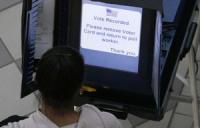-
Congressional amendments restore Maryland BioLab4 funding
Members of the Maryland congressional delegation attached amendments to the Homeland Security and Defense Department authorization bills to prevent the closure of the National Biodefense Analysis and Countermeasures Center (NBACC) at Fort Detrick, Maryland. President Trump’s budget for 2018 had eliminated funding for NBACC as part of cutting the budget of DHS Science and Technology Directorate (S&T) by 28 percent. At the end of May 2017, the research center received a letter from DHS stating that the facility’s closing procedures should start on 1October, with anticipated decommissioning by 30 September 2018.
-
-
Border funding bill passes U.S. House; Texans vote along party lines
The U.S. House on Thursday passed about $800 billion in federal spending, including $1.6 billion worth of funding that will go toward constructing a border wall. While there is almost no chance this legislation will become law, Republican lawmakers can head back to their home districts pointing to the wall funding as a legislative step toward a tenet of the Trump presidential campaign.
-
-
Updating a nearly 100-year-old law could shore up U.S. helium supply
Helium is essential for MRIs, the fiber optics that deliver images to our TVs, scientific research, and of course, party balloons. In the past decade, helium prices have sky-rocketed due to supply shortages. But if small updates are made to an old law, the United States could boost its domestic helium output and help keep critical medical tests and electronics running.
-
-
House panel: DOD to regard climate change as a direct threat to U.S. national security
During Wednesday’s markup of the Fiscal Year 2018 National Defense Authorization Act (NDAA), the Emerging Threats and Capabilities Subcommittee of the House Armed Services Committee passed by voice vote an amendment which acknowledges that “climate change is a direct threat to the national security of the United States.” The amendment instructs the Department of Defense to “ensure that it is prepared to conduct operations both today and in the future and that it is prepared to address the effects of a changing climate on threat assessments, resources, and readiness.”
-
-
Tech firms urge Congress to enact surveillance reforms
More than thirty leading internet companies have sent a letter to the chair of the House Judiciary Committee asking for reforms to the law used for carrying out mass surveillance. The letter concerns Section 702 of the Foreign Intelligence Surveillance Act (FISA). The act must be renewed by Congress before the end of the year. Over the years, the U.S. security agencies have creatively interpreted the law to allow them to store information on potentially millions of U.S. citizens – even though the law specifically requires the opposite.
-
-
April 2017 terrorism: The numbers
The House Homeland Security Committee has released its April 2017 Terror Threat Snapshot, which details terrorism events and trends in April 2017. The snapshot is a monthly committee assessment of the threat America, the West, and the world face from ISIS and other Islamist terrorists. The document is produced by the Majority Staff of the committee. It is based on information culled from open source materials, including media reports, publicly available government statements, and nongovernmental assessments.
-
-
House, Senate committees approve agroterrorism bill
The U.S. House of Representatives Homeland Security Committee and U.S. Senate Homeland Security and Governmental Affairs Committee passed the Securing our Agriculture and Food Act, clearing a key hurdle for the bill’s consideration by the full House and Senate. The Securing our Agriculture and Food Act requires the Secretary of Homeland Security (DHS), through the Assistant Secretary for Health Affairs, to lead the government’s efforts to secure the U.S. food, agriculture, and veterinary systems against terrorism and high-risk events.
-
-
Russia, Trump and the 2016 election: What’s the best way for Congress to investigate?

Exactly how will the U.S. conduct a fair and accurate investigation into Russian meddling in the 2016 election and links with President Donald Trump’s campaign? U.S. congressional leaders are discussing options. At a time when Congress is sharply polarized along partisan lines, congressional investigations tend to become microcosms of that polarization. This is all the more true when an investigation involves an issue about which the president is vulnerable to political embarrassment or attack. If the intelligence committee proves unable to conduct a thorough and bipartisan investigation of Russian meddling and Trump’s campaign, pressure will build on America’s leaders to establish a more independent probe. Hanging in the balance could be whether the United States can forge consensus about what happened and how to prevent it from happening again.
-
-
January 2017 terrorism: The numbers

The House Homeland Security Committee has released its February 2017 Terror Threat Snapshot, which details terrorism events and trends in January 2017. The snapshot is a monthly committee assessment of the threat America, the West, and the world face from ISIS and other Islamist terrorists. The document is produced by the Majority Staff of the committee. It is based on information culled from open source materials, including media reports, publicly available government statements, and nongovernmental assessments.
-
-
House ends rule preventing mentally ill people from buying guns
The House voted 235-180 to allow mentally ill people to buy and own guns. Lawmakers overturned a regulation which went into effect last year – and which affected about 75,000 people – which required the Social Security Administration to relay names of Social Security recipients diagnosed with mental health conditions, such as extreme anxiety and schizophrenia, and who are considered incapable of managing their own affairs. The names of these individuals were added to a database of citizens who are ineligible to purchase a firearm.
-
-
Russian hacking of 2016 U.S. elections threatens to “destroy democracy”: Sen. McCain

Senator John McCain (R-Arizona) said that Russia’s involvement in hacking U.S. political institutions and processes during the 2016 presidential election campaigns threatens to “destroy democracy” in its current form. The senator for Arizona warned there may soon be an “unraveling of the world order” and criticized the “absolute failure of the American leadership” to improve relations with Moscow. “There’s no doubt they were interfering and no doubt it was a cyber-attack. The question now is how much and what damage and what should the United States of America do? And so far, we’ve been totally paralyzed,” he said. “The truth is, they are hacking every single day.”
-
-
Saudi Arabia lobbies U.S. lawmakers to amend terrorism compensation law
Saudi Arabia has intensified its lobbying campaign in the United States in an effort to persuade American lawmakers to change a the Justice Against Sponsors of Terrorism Act (JASTA), a law which allows victims of the 9/11 terrorist attacks to sue countries implicated in terrorism against the United States – but a law which even its authors said was aimed at Saudi Arabia.
-
-
Expert: Iran falsely accusing U.S. of violating nuclear deal to gain more concessions
Iranian warnings against the passage of the Iran Sanctions Act (ISA) reflect “a broader strategy” in pursuit of additional sanctions relief, a senior analyst at the Foundation for Defense of Democracies, wrote in a policy brief on Saturday. The ISA was originally passed in 1996, targeting Iran’s energy sector and expanding U.S. secondary sanctions. The House of Representatives overwhelmingly approved a ten-year extension of the act earlier this month. In order to be renewed, the legislation must now pass the Senate and be signed into law by President Barack Obama.
-
-
Britain faces U.S. legal claims as a result of new terror-sponsors law
Senior British political and military figures have warned that Britain faces a wave of legal claims from U.S. lawyers — and could even be taken to court by victims of ISIS follower Jihadi John. The warning comes in the wake of Congress passing the controversial Justice Against Sponsors of Terrorism Act (JASTA), which permits U.S.-based lawyers to sue foreign states for not doing enough to tackle terrorism, and limit terrorist activities by their citizens.
-
-
Calls for creating centralized congressional focus on homeland security
In preparation for the organization of the 115th Congress, the co-chairs of the Blue Ribbon Study Panel on Biodefense last week delivered a letter to Congressman Pete Sessions (R-Texas), chair of the Committee on Rules, asking that special consideration be given to the jurisdiction of the House Committee on Homeland Security. The letter says that current congressional oversight structure is severely fractured, resulting in reactive policymaking that threatens America’s ability to combat biological threats.
-
- All
- Regional
- Water
- Biometrics
- Borders/Immig
- Business
- Cybersecurity
- Detection
- Disasters
- Government
- Infrastructure
- International
- Public health
- Public Safety
- Communication interoperabillity
- Emergency services
- Emergency medical services
- Fire
- First response
- IEDs
- Law Enforcement
- Law Enforcement Technology
- Military technology
- Nonlethal weapons
- Nuclear weapons
- Personal protection equipment
- Police
- Notification /alert systems
- Situational awareness
- Weapons systems
- Sci-Tech
- Sector Reports
- Surveillance
- Transportation
Advertising & Marketing: advertise@newswirepubs.com
Editorial: editor@newswirepubs.com
General: info@newswirepubs.com
2010-2011 © News Wire Publications, LLC News Wire Publications, LLC
220 Old Country Road | Suite 200 | Mineola | New York | 11501
Permissions and Policies
Editorial: editor@newswirepubs.com
General: info@newswirepubs.com
2010-2011 © News Wire Publications, LLC News Wire Publications, LLC
220 Old Country Road | Suite 200 | Mineola | New York | 11501
Permissions and Policies
